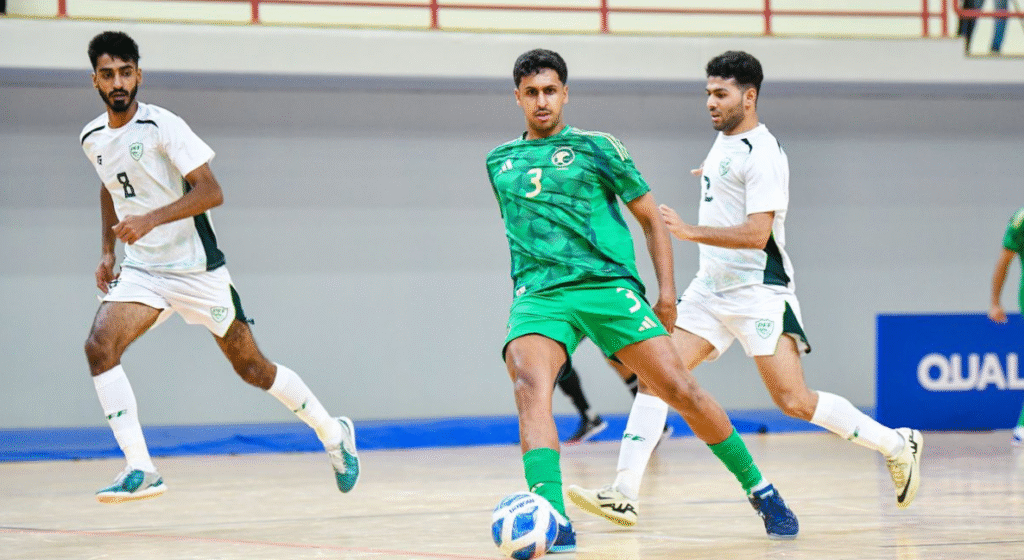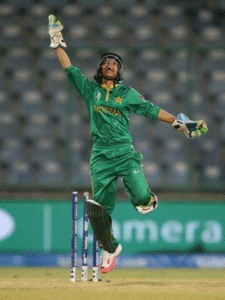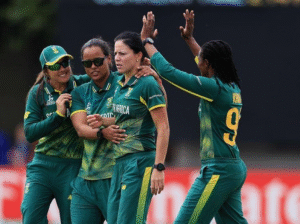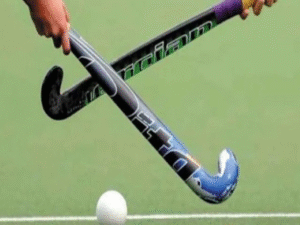
Pakistan’s hopes of qualifying for the 2025 AFC Futsal Asian Cup ended after a humiliating 13-0 defeat to hosts Saudi Arabia, marking their second straight loss in Group D.
Pakistan’s Qualification Hopes End with Heavy Defeat
Pakistan’s dream of securing a place in the AFC Futsal Asian Cup 2025 came to a devastating end on Monday night as they suffered a 13-0 thrashing at the hands of Saudi Arabia in their second Group D match in Anak, Saudi Arabia.
The lopsided result followed Pakistan’s 8-1 loss to Iraq in their opening game, confirming their early exit from the qualification round. With two defeats in as many games, the Green Shirts can no longer finish second in the group — effectively ending their campaign.
For Pakistan, the tournament has exposed the team’s lack of experience and preparation in international futsal, especially when facing stronger and more technically advanced opponents.
Qualification Format and What the Loss Means
The AFC Futsal Asian Cup Qualifiers feature eight groups, with group winners earning automatic qualification for next year’s main event in Indonesia. Additionally, the seven best second-placed teams across all groups will also advance.
Pakistan’s back-to-back defeats have left them bottom of Group D, making qualification mathematically impossible.
Meanwhile, Iraq and Saudi Arabia — both undefeated — will now face off on Wednesday to determine who secures top spot in the group.
Pakistan’s final fixture, also on Wednesday, will be against Chinese Taipei, who lost to Iraq earlier in the competition. That match will be Pakistan’s final opportunity to earn a consolation victory and restore some pride before heading home.
Saudi Arabia Dominate from Start to Finish
The match against Saudi Arabia was a one-sided affair from the opening whistle. The hosts came out firing on all cylinders, scoring six goals within the first seven minutes, completely overwhelming Pakistan’s defense.
Saudi star Eibab Mohammed led the charge, completing his hat-trick in record time, while teammates Abdullah Alaqeeli, Abdulilah Alotaibi, and Moath Alasiri also got on the scoresheet early.
By the 14th minute, Saudi Arabia were already 8-0 up, with Fahad Aljohani and Fahad Muhalhil adding two more goals to an already embarrassing scoreline for Pakistan.
Despite Pakistan’s attempts to tighten their defense in the second half, the floodgates opened once again. The Saudis added five more goals through Farhan Alasmari (32’), Aljohani (34’), Saleh Alqarni (37’), Abdullah Almaghrabi (38’), and Alotaibi (38’) to complete the 13-0 rout.
A Night to Forget for Pakistan
For Pakistan, the defeat highlighted their struggles to adapt to the pace and tactical demands of international futsal.
The team appeared disjointed and lacked defensive coordination, often leaving large gaps that allowed Saudi Arabia’s fast-moving forwards to exploit with ease.
Goalkeeper Atif Nawaz, who faced a barrage of shots throughout the game, made several saves to prevent the scoreline from being even worse. But with little support from the defense and no sustained possession, Pakistan never stood a chance of mounting a challenge.
The team’s few offensive forays were easily thwarted by the Saudi defense, and Pakistan failed to register a single goal attempt of note in the second half.
Tactical Breakdown: Where It Went Wrong
A closer look at the match reveals several underlying issues that contributed to Pakistan’s crushing defeat:
- Defensive Disorganization:
Pakistan’s players were slow to track back and often left spaces in front of the goal. Saudi Arabia exploited these weaknesses with quick passes and off-the-ball movement. - Lack of Pressing:
The Green Shirts allowed Saudi Arabia’s midfielders far too much time on the ball. Without coordinated pressing or interceptions, Saudi playmakers dictated the tempo effortlessly. - Poor Transition Play:
Pakistan struggled to move from defense to attack. Their counterattacks were isolated and lacked support, often leading to turnovers and more pressure on their backline. - Fitness and Conditioning:
Saudi Arabia’s superior stamina and agility became evident as the match progressed. Pakistan’s players looked physically drained, especially in the final ten minutes. - Goalkeeping Overload:
Despite conceding 13 goals, Pakistan’s goalkeeper faced over 25 attempts on target. This stat alone underscores how much of the game was played in Pakistan’s half.
Saudi Arabia’s Ruthless Efficiency
For Saudi Arabia, the performance was a statement of intent. The hosts displayed tactical discipline, creativity, and finishing prowess, sending a strong message to other qualifiers.
Their ability to switch formations mid-game, use the flanks effectively, and rotate players ensured sustained pressure throughout.
Eibab Mohammed’s early hat-trick set the tone, while Marizanne Kapp’s equivalent impact in the women’s game — as seen in South Africa’s recent dominance — offers a parallel example of how individual brilliance can lift an entire team.
Saudi coach Ali Al-Khudair praised his players’ effort, saying, “We respected our opponents and played professional futsal. Every match matters because goal difference could decide qualification, so we kept attacking.”
Pakistan’s Growing Futsal Journey
Although the results have been harsh, Pakistan’s participation in the AFC Futsal Qualifiers marks an important step in rebuilding their presence in Asian futsal.
Futsal — a shorter, indoor version of football — has gained popularity in Pakistan in recent years, but infrastructure and international exposure remain limited.
The Pakistan Football Federation Normalization Committee (PFF NC), which oversees national team operations, reintroduced futsal development programs in 2022, hoping to nurture homegrown talent for future tournaments.
However, the gulf between established Asian teams like Saudi Arabia, Iran, Japan, and Thailand remains significant.
“Our players are passionate but inexperienced,” a PFF official told reporters after the match. “We need more international tours, proper coaching structures, and competitive domestic leagues to close the gap.”
Lessons and Areas of Improvement
The tournament has served as a wake-up call for Pakistan’s futsal management. Here are some key takeaways from their qualification campaign:
- Invest in Youth Development: Pakistan must build structured youth academies dedicated to futsal training and tactical awareness.
- Hire Specialized Coaches: Futsal coaching differs greatly from outdoor football, and hiring certified futsal coaches is crucial.
- Increase International Exposure: Regular participation in South Asian and regional futsal tournaments will help players adapt to global standards.
- Focus on Conditioning: Improved fitness and speed training can reduce the physical gap between Pakistan and top Asian teams.
- Improve Goalkeeping Standards: Pakistan’s goalkeepers need specialized drills to handle high-intensity futsal scenarios.
Reactions from Fans and Analysts
The defeat sparked a wave of reactions across social media. While many fans expressed disappointment, others urged patience and long-term planning.
Sports analyst Adeel Hashmi commented, “You can’t build a competitive futsal team overnight. Pakistan needs a 5-year plan focused on structure, not short-term results.”
Some fans on X (formerly Twitter) voiced frustration at the lack of preparation before such a crucial international event. One post read:
“Sending a team without a full training camp or international friendlies was never going to work. The scoreline reflects mismanagement, not just player performance.”
Others, however, appreciated the players’ effort despite the challenges. Another fan wrote:
“At least we’re competing. Losing is part of learning — this team deserves our support, not criticism.”
Looking Ahead: Pakistan’s Final Game
Pakistan’s final group match against Chinese Taipei offers a chance to end their campaign on a positive note.
Although it won’t affect the standings, a victory could boost team morale and give younger players valuable experience.
Head coach Rashid Qureshi is expected to make several changes, possibly resting senior players and giving opportunities to emerging talent such as Ali Raza and Mohammad Sameer.
“We’ll play for pride,” Qureshi said. “Every match is a learning opportunity, and we want to finish the tournament with something to build on.”
Regional Dominance and the Road to Indonesia
With powerhouses like Iran, Japan, Thailand, and Uzbekistan dominating the Asian futsal circuit, Pakistan’s short-term goal will be to strengthen its presence regionally.
The AFC Futsal Asian Cup 2025 in Indonesia is set to feature 16 teams, including automatic qualifiers and top performers from the eight qualifying groups.
As of now, Saudi Arabia and Iraq remain favorites to advance from Group D, while Pakistan will return home to reassess their strategy and development plans.
Conclusion: A Painful Lesson, but a Starting Point
Pakistan’s 13-0 loss to Saudi Arabia will be remembered as one of their heaviest defeats in international futsal — a painful reminder of the long road ahead.
Yet, amid the disappointment, this tournament marks an important learning phase for Pakistan’s futsal program. Competing at this level, despite limited preparation, has exposed the areas that need urgent improvement — from coaching to infrastructure.
While qualification for the AFC Futsal Asian Cup 2025 is now out of reach, the experience gained in Anak could serve as the foundation for a stronger, better-prepared Pakistan side in the years to come.
As the Green Shirts prepare for their final match, the message remains clear: progress in sports is built over time — through patience, structure, and persistence.
Internal Linking Suggestions:
- Link “AFC Futsal Asian Cup 2025” to your event preview or tournament schedule article.
- Link “Pakistan futsal team” to a player profile or background piece.
- Link “Pakistan Football Federation” to your governance and reforms coverage.
- Link “Saudi Arabia futsal” to your match summary or regional sports updates.



